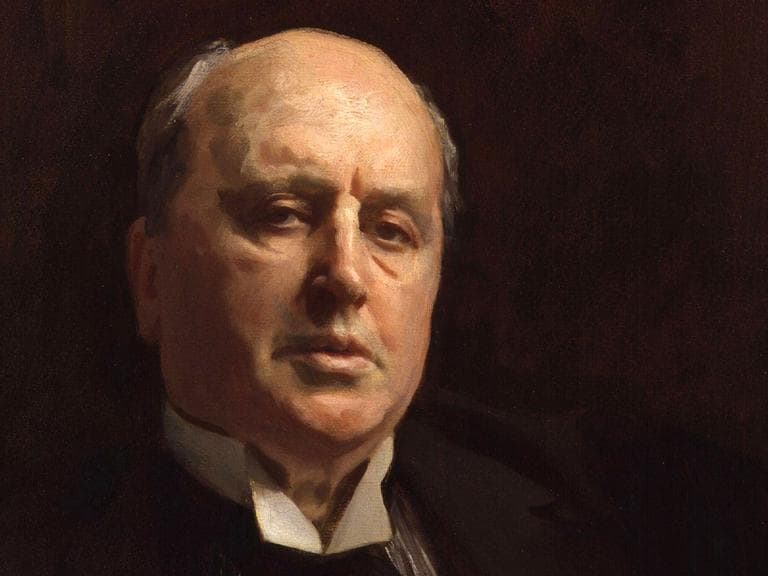Advertisement
Henry James’ 'Portrait Of A Lady'
ResumeA fresh take that finds a bridge out of the Victorian Age and a tough comment on American exceptionalism.

American exceptionalism is a hot topic again in this year’s presidential campaign. Are we or are we not fundamentally different? Uniquely able to make our own way in the world? To master our own fates? It’s not a new idea. The great Henry James took it on in his novel Portrait of a Lady more than a century ago.
A novel bridging up out of the Victorian age, toward the modern. With a woman at its heart. Struggling to define her own life. Meeting limits of history and human nature.
This hour, On Point: American exceptionalism and Henry James “Portrait of a Lady.”
-Tom Ashbrook
Guests
Michael Gorra, professor of English at Smith College and author of Portrait of a Novel: Henry James and the Making of an American Masterpiece.
Susan Griffin, chair of the English department at the University of Louisville. She is editor of the Henry James Review and the author of Henry James Goes to the Movies.
From Tom's Reading List
The Daily Beast "Is Henry James’s ‘The Portrait of a Lady’ the great American novel? Michael Gorra makes the case that even in Europe, Isabel Archer’s sense of her independence and exceptionalism—and its limits—reflected America’s own."
The New Yorker "This is hardly the most American of starts, and certainly not the most American of sentiments; those readers, if canvassed, could have nominated a host of more agreeable experiences. The whole setup sounds suspiciously English; was it for this that Emerson, Longfellow, James Russell Lowell, and others had founded the magazine, twenty-three years before? Suspicions are confirmed, as the tale unfurls; the setting is indeed an English lawn, rug-soft, on a waning summer’s day, and one of the tea-takers, to make matters worse, is an English lord."
Huffington Post "It is not surprising that the choice puzzling most readers revolves around Isabel's choice of a husband. To paraphrase Jane Austen, it is a truth universally acknowledged, at least by readers of fiction, that a young woman in possession of a fortune must be in want of a husband. Of course she has opinions about marriage — what heroine doesn't? But this heroine is different: "The first on the list was a conviction of the vulgarity of thinking too much of it.""
More:
This is the trailer for the 1996 film adaptation of Portrait of a Lady.
Text: Portrait of a Lady
Henry James. (1843–1916). The Portrait of a Lady.
The Harvard Classics Shelf of Fiction. 1917.
Chapter I
UNDER certain circumstances there are few hours in life more agreeable than the hour dedicated to the ceremony known as afternoon tea. There are circumstances in which, whether you partake of the tea or not—some people of course never do—the situation is in itself delightful. Those that I have in mind in beginning to unfold this simple history offered an admirable setting to an innocent pastime. The implements of the little feast had been disposed upon the lawn of an old English country-house, in what I should call the perfect middle of a splendid summer afternoon. Part of the afternoon had waned, but much of it was left, and what was left was of the finest and rarest quality. Real dusk would not arrive for many hours; but the flood of summer light had begun to ebb, the air had grown mellow, the shadows were long upon the smooth, dense turf. They lengthened slowly, however, and the scene expressed that sense of leisure still to come which is perhaps the chief source of one’s enjoyment of such a scene at such an hour. From five o’clock to eight is on certain occasions a little eternity; but on such an occasion as this the interval could be only an eternity of pleasure. The persons concerned in it were taking their pleasure quietly, and they were not of the sex which is supposed to furnish the regular votaries of the ceremony I have mentioned. The shadows on the perfect lawn were straight and angular; they were the shadows of an old man sitting in a deep wickerchair near the low table on which the tea had been served, and of two younger men strolling to and fro, in desultory talk, in front of him. The old man had his cup in his hand; it was an unusually large cup, of a different pattern from the rest of the set, and painted in brilliant colours. He disposed of its contents with much circumspection, holding it for a long time close to his chin, with his face turned to the house. His companions had either finished their tea or were indifferent to their privilege; they smoked cigarettes as they continued to stroll. One of them, from time to time, as he passed, looked with a certain attention at the elder man, who, unconscious of observation, rested his eyes upon the rich red front of his dwelling. The house that rose beyond the lawn was a structure to repay such consideration, and was the most characteristic object in the peculiarly English picture I have attempted to sketch.
You can read the full text here.
Excerpt: Portrait of a Novel
Use the navigation bar at the bottom of this frame to reformat the excerpt to best suit your reading experience.
This program aired on September 11, 2012.